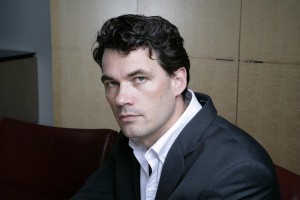BT’s Patterson defends Openreach ahead of Ofcom announcement
BT CEO Gavin Patterson has defended infrastructure arm Openreach’s continued existence as a part of the UK telco, ahead of tomorrow’s recommendations on the issue by regulator Ofcom.
Using his appearance at this week’s Mobile World Congress in Barcelona to address the topic, Patterson said the UK market was “highly competitive” both in infrastructure, thanks to Virgin Media, and in services.
“Openreach doesn’t provide all the internet but it is the one national player and it’s very tightly regulated at the moment,” he said, adding that the unit had helped the development of broadband in the country.
“We believe having Openreach as a unit within BT is the right approach…which ensures you can provide a national service at competitive prices,” said Patterson. “If it was separated would you make the same investment decisions as a standalone business? I don’t think you would. The investment cycles are so long.”
He said the payback for Openreach’s investment when it took the decision to invest in a next generation network in 2009 was 20 years. “As part of a wider group you can make an investment that works for the UK as a whole,” he said. “The costs are huge. No one is sitting around…waiting to invest.”
Patterson said he hoped that the Ofcom review would look into pay TV and content as well as the question of Openreach.
He said BT wanted to see a level playing field from regulation. “BT will only have a one third share of the fixed market and the wireless market. That is not true in other markets that are part of a converged bundle,” he said.
Patterson said the heart of BT’s business was “the network itself”, and that the company was ready to invest in the next generation of technology including fibre to the premises and G.Fast. “That’s a big decision and we are ready to make it if we get [certainty] from the Ofcom review,” he said.
Patterson said that BT had returned to mobile with the acquisition of EE, which he described as a “transformational” deal for the company. “We’ve been investing in wireless R&D for a while, and I anticipate we’ll be at the forefront of 5G delivery in the UK,” he said.
He claimed that the UK was late to develop a convergence play, in part because in other countries the main former incumbent telco has had both fixed and mobile arms.
Turning to BT’s investment in content, Patterson said that investing in sport was costly, but that BT wanted to ensure a reliable supply of premium content to its subscribers.
“Sport is an expensive habit to keep,” he said. “It is at the heart of what we do, but we also want to make sure our customers can get access to great movies and the best on demand content. We will work with everybody to get that content.”
Patterson said he wanted BT customers to get the best entertainment they want, including YouTube. He said BT had to keep an eye on how people are using media. He said Netflix and YouTube are the dominant sources of data traffic on BT’s network, with use of BBC iPlayer migrating from streaming to a wider use of download to watch later. Growth in data consumption is a “huge challenge” for BT, said Patterson.




